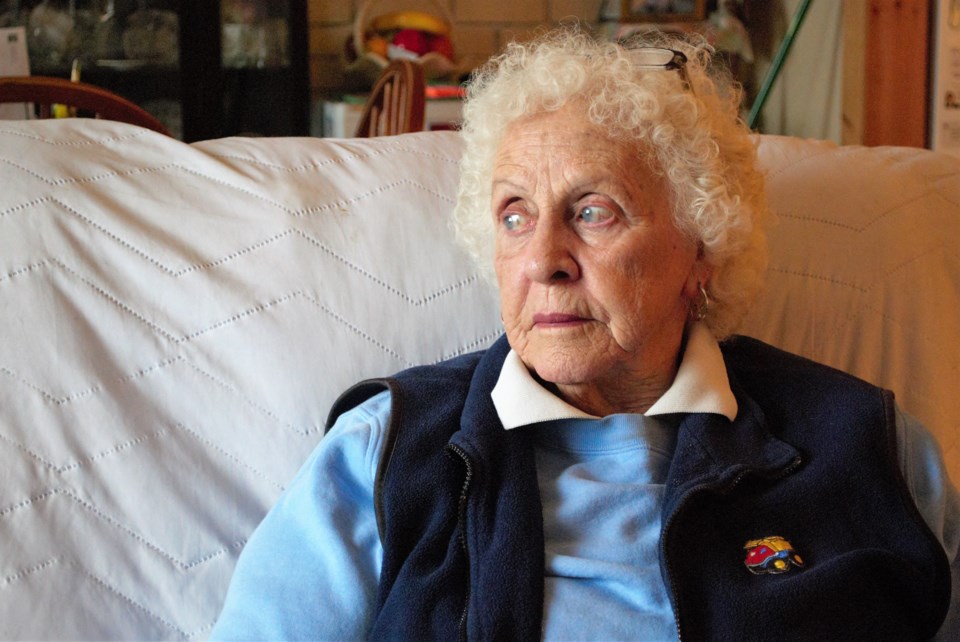A strong work ethic and a love for factory work led to a local woman settling down in Collingwood in the 1950s, and that work ethic trickled over into other aspects of her life and the community.
For this week’s edition of People of Collingwood we sat down with Birdie Anderson, 84, a former textile worker who lobbied for girls hockey in Collingwood and has given her time to many causes around town over the years.
Q: How long have you lived in Collingwood?
A: I moved here because my husband was working at McKean Quarries. We were married when we were 18 or 19.
I came here to work at Peerless Textiles (in Collingwood). That’s what I’ve always done.
My mother was a teacher. We lived on a farm. I didn’t go to high school. She was very upset with me.
I turned 15 on April 3 and I was working by September... in Owen Sound, Mount Forest.
I’ve always worked. I love factory work.
Q: Were those kinds of jobs more male-dominated?
A: No. Not at Peerless Textiles.
There had to be 150 women in there. There were maybe 25 men.
Q: What about the work did you really enjoy?
A: I enjoyed every minute of it.
I put domes on blue jeans, rivets on back pockets and in the front.
They used to have three people doing those tasks.
I was there two weeks, and I was bored out of my skull. Finally, I went to the foreman and I said, “I know I haven’t been here very long, but if I can make a suggestion. If you don’t like it, fine, but I really wish you would listen to me for 15 or 20 minutes.”
He listened.
I said, “If you put the rivet machine here and the two dome machines here, I can run all three machines (myself).”
Every factory I worked in after that, I rearranged their machines (the same way).
Q: And they were receptive to that feedback?
A: Well, they’d better be. I saved them two people where they could put them somewhere else. It was a rhythm. It’s like playing piano or guitar.
Once you got that rhythm, it was just simple.
One thing I wouldn’t do was sew. Once, I got a needle in the eyeball at the factory when helping someone else with their work.
I refused after that.
I had good bosses here.
Q: The person who nominated you said you worked hard to make it possible for girls to play hockey here in Collingwood. Could you tell me a little bit about that?
A: They wouldn’t give us any ice time (in the 1990s). At the time, we only had one arena.
My granddaughter was a crackerjack hockey player, her home hockey arena was in Angus.
A lot of Collingwood girls went to Angus. Creemore had ice time, so did Stayner, but we had no time.
She ended up playing boys hockey here. Her mom and dad were also instrumental in that. She wasn’t the only one – there were maybe five or six girls who played.
She played right up through to midget, and then had to go to Angus.
I was yelling and hollering all the time about ice time. They had figure skating, and they thought that was enough.
That’s when we got girls hockey here, but other towns had it way before Collingwood did.
Q: What other community endeavours did you get involved with?
A: I taught Sunday school (at All Saints’ Anglican Church), and the Girl Guides of Canada. Through minor hockey I helped put on big dinners. You couldn’t really do that now because everybody’s working, nobody has the time. And you have to work in this day and age.
Q: You’ve lived in Collingwood since the 1950s. What kinds of changes have you seen in the time you’ve lived here?
A: There’s too much building on the wetlands.
We’ve let our (factory) industries go, when they could have been kept.
Not everybody is a doctor or lawyer or nurse. There used to be good employment here for men and women.
(The town) didn’t make enough effort to keep places like that.
Also, to build like they’re building, is crazy.
The Shipyards development is a real eyesore, as far as I’m concerned.
I’m too old now to go fight at council.
To me, the town has gone backwards, instead of going ahead.
Q: What are your hopes for Collingwood?
A: Stop building on wetlands.
Stop building on farmland.
We need farmland to grow our food.
One thing that’s good about Collingwood is we now have more gardens. They’re growing vegetables on our main street. It’s fantastic.
If we don’t start doing this, we’re not going to have any food to eat.
My father had 100 acres. We made a living on it.
Today’s farming is not like that.
Leave the farmland and the wetland alone. We don’t need any more empty houses.
Money isn’t everything.
We used to live over on St. Paul Street, the last house right down next to the shipyard. We moved in there in 1962. It was a wonderful place to live.
I’ve had a wonderful life, I wouldn’t change a thing.
For our feature People of Collingwood, we’ll be speaking with interesting people who are either from or are contributing to the Collingwood community in some way. This feature will run on CollingwoodToday every Saturday. If you’d like to nominate or suggest someone to be featured in People of Collingwood, email [email protected].



